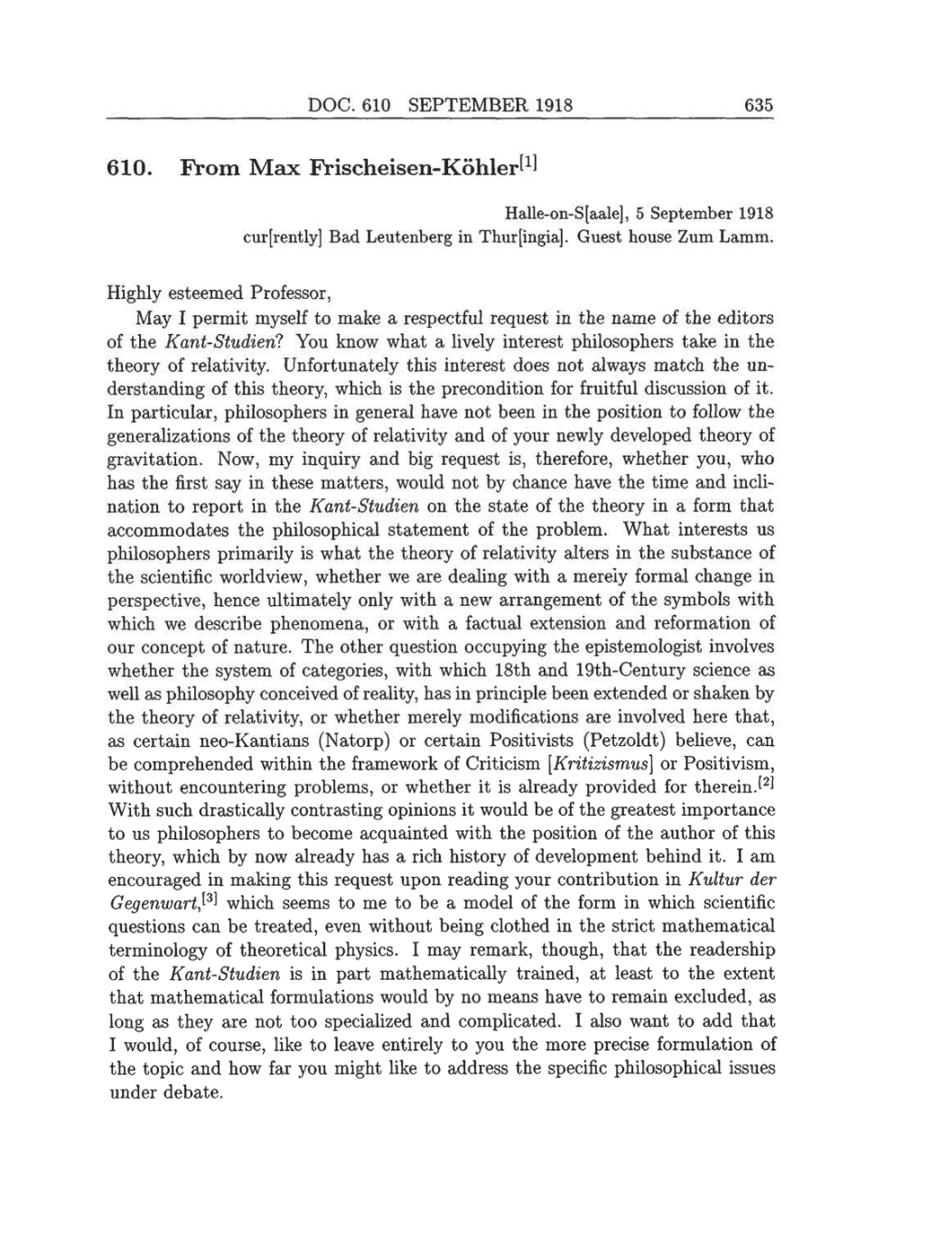DOC.
610
SEPTEMBER
1918 635
610.
From Max
Frischeisen-Köhler[1]
Halle-on-S[aale],
5
September 1918
cur[rently]
Bad
Leutenberg
in
Thur[ingia].
Guest
house Zum Lamm.
Highly
esteemed
Professor,
May
I permit
myself
to make
a respectful request
in the
name
of
the
editors
of
the
Kant-Studien? You know
what
a
lively
interest
philosophers
take in
the
theory of
relativity.
Unfortunately
this interest does not
always
match the
un-
derstanding
of
this
theory,
which
is
the
precondition
for fruitful discussion
of
it.
In
particular,
philosophers
in
general
have not been in
the
position
to follow
the
generalizations
of
the
theory
of
relativity
and
of your newly developed
theory
of
gravitation.
Now,
my inquiry
and
big request
is,
therefore,
whether
you,
who
has
the
first
say
in these
matters,
would not
by
chance have
the
time
and
incli-
nation
to
report
in
the
Kant-Studien
on
the
state of
the
theory
in
a
form
that
accommodates
the
philosophical
statement of
the
problem.
What interests
us
philosophers primarily
is
what the
theory
of
relativity
alters in
the
substance of
the scientific
worldview,
whether
we are
dealing
with
a
merely
formal
change
in
perspective,
hence
ultimately
only
with
a new
arrangement
of
the
symbols
with
which
we
describe
phenomena, or
with
a
factual extension
and
reformation of
our concept
of nature. The
other
question
occupying
the
epistemologist
involves
whether the
system
of
categories,
with which 18th and
19th-Century
science
as
well
as
philosophy
conceived
of
reality,
has in
principle
been extended
or
shaken
by
the
theory
of
relativity,
or
whether
merely
modifications
are
involved here that,
as
certain
neo-Kantians
(Natorp) or
certain Positivists
(Petzoldt)
believe,
can
be
comprehended
within
the
framework
of
Criticism
[Kritizismus] or
Positivism,
without
encountering problems, or
whether it
is
already provided
for
therein.[2]
With
such
drastically contrasting
opinions
it would be
of
the
greatest importance
to
us
philosophers
to become
acquainted
with the
position of
the author
of
this
theory,
which
by
now
already
has
a
rich
history
of
development
behind it.
I
am
encouraged
in
making
this
request upon reading your
contribution
in
Kultur
der
Gegenwart,[3]
which
seems
to
me
to be
a
model
of
the
form in which scientific
questions
can
be
treated,
even
without
being
clothed in
the strict mathematical
terminology
of
theoretical
physics.
I
may remark, though,
that
the
readership
of
the Kant-Studien
is
in
part mathematically trained,
at least to
the
extent
that mathematical
formulations would
by
no means
have to remain
excluded,
as
long
as
they
are
not too
specialized
and
complicated.
I
also want to add
that
I
would,
of
course,
like to
leave
entirely
to
you
the
more
precise
formulation of
the
topic
and how far
you
might
like
to address the
specific
philosophical
issues
under
debate.
